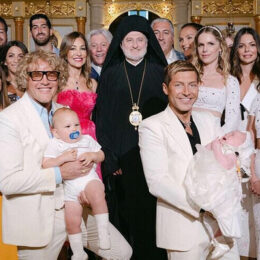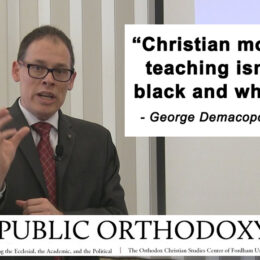 by George J. Marlin –
by George J. Marlin –
Christians who spar in the political arena have grown accustomed to being pounded by secular ideologists who deny the spiritual and look askance at most traditional moral constraints. Though we have taken punches, we are still standing. But the secularists’ latest offensive to eradicate all traces of our Judeo-Christian heritage from American society is, in my judgment, most disconcerting and may be the knockout blow.
Secularists have moved beyond dismissing Christians as anti-intellectual and anti-rational. They are now publicly ridiculing them and questioning their fitness to participate in public life. They portray religious beliefs as nothing more than superstitions, old wives’ tales, or legends, and claim anyone who believes such drivel is balmy. Is it any wonder, then, that agencies like HHS now think they can ride roughshod over the conscience rights of individuals and religious institutions?
For example, Washington State University history professor Matthew Avery Sutton warned in a New York Times op-ed that the public must beware of crackpot Christian candidates who believe in the Second Coming and Armageddon. Catholics must be on the suspect list because we hold that “Christ ascended into Heaven and is seated at the right hand of the Father, from thence he will come again to judge the living and the dead.”
Such people, the professor fears, are out to harm or destroy President Obama because “not since [F.D.] Roosevelt have we had a president of charisma and global popularity who so perfectly fits the evangelicals Antichrist mold.” Sutton is convinced that in 2012 apocalyptic anti-statists will accuse Obama of preparing the nation “for the Antichrist’s global coalition.”
And they call believers delusional.
Then there’s New York Times editor Bill Keller, who demanded in the paper’s magazine that Republican presidential candidates be asked tougher questions about their faith. The 2012 primary season “offers an important opportunity to confront our scruples about the privacy of faith in public life – and to get over them.”
Keller wants candidates who belong to religions “that are mysterious or suspect to many Americans” to receive the same level of scrutiny as those who believe “space aliens dwell among us.” To prove he is open-minded, he concedes all organized religions have “bizarre baggage.” “I grew up believing,” he wrote, “that a priest could turn a bread wafer into the actual flesh of Christ.” (It’s fashionable in certain secular salons to refer to Catholics as believing in a kind of cannibalism.)
Because presidential candidates Rick Perry and Michele Bachmann allegedly belong to “fervid subsets of evangelical Christianity” and Rick Santorum is a practicing Catholic, Keller raises “concerns about their respect for the separation of church and state, not to mention the separation of fact and fiction.” Hence, he demands that every presidential candidate be asked if they place fealty to “some other authority higher than the Constitution and laws of this country.”
If people are to be judged unfit for public life because they hold that God’s law supersedes man-made civil law then most of America’s most revered leaders would have been declared unfit. Here’s a sampling of American icons who would have flunked the Keller test:
- Thomas Jefferson, who justified the American cause for separation from Great Britain by arguing the “laws of nature and nature’s god” entitled them to independence.
- Alexander Hamilton, who argued there is a higher law than human law that is “written as with a sunbeam … by the hand of Divinity itself and can never be erased or obscured by mortal power.”
- George Washington, who at his first inauguration declared, “it would be peculiarly improper to omit in this first official act my fervent supplications to the Almighty Being, who rules over the Universe, who presides in the Councils of Nations, and whose providential aids can supply every human defect…”
- John Adams, who wrote that “our Constitution was made only for a religious and moral people. It is wholly inadequate for the government of any other.”
Let’s not forget Daniel Webster and Abraham Lincoln who invoked God’s law in making the case against slavery. And what about the aforementioned Franklin D. Roosevelt who demanded that the Nazis’ hierarchy – who violated no existing German civil laws – be punished “for atrocities which have violated every tenet of the Christian faith.” Was he unfit for office because, based on his faith, he judged such people guilty?
Finally, was Martin Luther King out of line for insisting, “A just law is a man-made code that squares with the moral law or the law of God. . . . An unjust law is a code that is out of harmony with the natural law.”
The new and growing secularist tactic being employed to marginalize religious influence is ridicule. Bill Keller gives a back-handed slap to the Mormon religion of presidential contenders John Huntsman and Mitt Romney by referring to it as a faith many “have been taught is a ‘cult’ and that many others think is just weird.” Mainstream media has mocked Governor Rick Perry for holding a prayer gathering in Houston and urging Texans to fast and repent.
We have reached a turning point in public life. If Catholics do not join with others and stand up to this secular barrage and effectively articulate, as our Church is well equipped to do, that faith and reason march hand in hand, policy positions based on religious principles will be banned from public discourse, Christian politicians will be assigned to the fringe of the political spectrum, and all believers will be dismissed, by the mere fact of believing, as cranks.




It isn’t just politicians! If you blog or even comment on Facebook and have taken a stand in favor of traditional Christian morality, then you are barred from employment at many firms. I have had multiple job interviews go very well, only to have the process terminate right about the time I know that the companies did a “social audit.” After Googling my name, they figured out that I am traditionally Orthodox and have taken a stand on issues. Boom! No job for me. I don’t think this is uncommon at all at this point.
Keller argues that we should scrutinize the religious beliefs of political candidates.
You respond by writing about the religious beliefs of historic politicians.
It sounds like you’re basically on the same page.